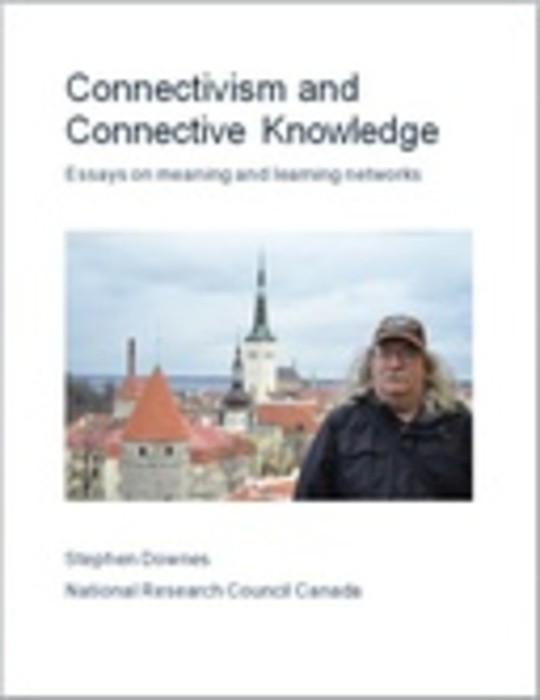
Connectivism and Connective Knowledge: Essays on meaning and learning networks
Free
Description
Contents
Reviews
Language
English
ISBN
978-1-105-77846-9
Title Page
Contents
Introduction
Introducing My Work
Knowledge, Learning and Community
E-Learning Generations
A Gathering of Ideas
A Series of Questions
What I'm Working On
Some Principles of Effective E-Learning
Networks, Connectivism and Learning
Semantic Networks and Social Networks
The Space Between the Notes
The Vagueness of George Siemens
Network Diagrams
What Networks Have In Common
The Personal Network Effect
Diagrams and Networks
The Blogosphere is a Mesh
The Google Ecosystem
What Connectivism Is
Connectivism and its Critics: What Connectivism Is Not
Connectivism and Transculturality
Theoretical Synergies
A Truly Distributed Creative System
The Mind = Computer Myth
What's The Number for Tech Support?
Informal Learning: All or Nothing
Non-Web Connectivism
Meaning, Language and Metadata
Principles of Distributed Representation
When Words Lose Meaning
Concepts and the Brain
On Thinking Without Language
Planets
Types of Meaning
Naming Does Not Necessitate Existence
Connectivism, Peirce, and All That
Brakeless Trains - My Take
Meaning as Medium
Patterns of Change
Speaking in LOLcats
Knowledge and Knowing
Belief
Confirming Theories
The New Nature of Knowledge
More on New Knowledge
Knowledge Mobilization and Knowledge Translation
Data
Content and Data
Knowledge and Recognition
Pattern Recognition as Skill
Memory and Memorization
A Simple Definition of Knowledge?
How Do You Know?
How Do You Know? (2)
An Introduction to Connective Knowledge
Types of Knowledge and Connective Knowledge
Relativism and Science
Cosmology and Economics
Having Reasons
Groups and Networks
Community Blogging
Groups and Networks
Connectives and Collectives: Learning Alone, Together
Small Groups
Connectivist Dynamics in Communities
Geese
Networks, Communities, Systems
The Cloud and Collaboration
You work in a community, not a company
That Group Feeling
Groups vs Networks: The Class Struggle Continues
Groups
Walls
Inward Facing
Collabularies
Networks, Power and Ethics
Networks, Neighbourhoods and Communities: A Reflection
The Secreted Life of Bees
The Semantic Condition
Cascades and Connectivity
Influence
What Is Democracy In Education
Autonomy
A Model of Autonomy
Uniqueness and Conformity
Homophily and Association
More on Sameness
What's Already Been Proven
The Role of Open Educational Resources in Personal Learning
Network Equity (1) - Selective Attraction
Collaboration and Cooperation
Surveys Are Not Connective Knowledge
Three Models of Knowledge Production
Massive Open Online Courses
How This Course Works
Principles of Resource Sharing
Creating the Connectivist Course
What a MOOC Does
How to Participate in the MOOC
How to Participate in the MOOC - 2
That's Week One in the Record Books
Response to Fitzpatrick
Engagement and Motivation in MOOCs
The Right Mix
MOOCs and the OPAL Quality Clearinghouse
Education as Platform: The MOOC Experience and what we can do to make it better
Personal Learning Environments
Content and Assessment
Review: The Edupunks' Guide, by Anya Kamenetz
Serialized Feeds
Where the Future Lies
Engagement and Personalized Learning
Learning and Assessment
Recognizing Learning
Free Learning and Control Learning: On the So-Called Failure of Constructivist, Discovery, Problem-Based, Experiential, and Inquiry-Based Teaching
Response to Kirschner
"More German" and Learning Atoms
Connectivism and Connective Knowledge
The Knowledge Hunters
Footnotes
The book hasn't received reviews yet.











